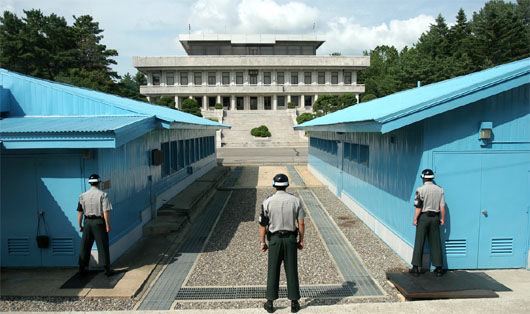by WorldTribune Staff, January 5, 2018
North Korea on Jan. 5 accepted South Korea’s offers of talks to be held next week in the DMZ truce village of Panmunjom in the first official meeting between delegations from the two Koreas since December 2015.
President Donal Trump “is taking credit for easing tensions that might have resulted from U.S. and South Korean forces staging their annual exercises at the same time the Games were taking place,” WorldTribune.com columnist Donald Kirk noted on Jan. 4.

In a tweet, Trump asked rhetorically, “Does anybody really believe that talks and dialogue would be going on between North and South Korea right now if I wasn’t firm, strong and willing to commit our total ‘might’ against the North.” Indeed, he added that “talks are a good thing!”
The North’s acceptance of the offer came hours after South Korean President Moon Jae-In and U.S. President Donald Trump agreed to defer joint military exercises until after the Winter Olympic Games.
U.S. Ambassador to the UN Nikki Haley said on Jan. 3 that “We won’t take any of the talks seriously if they don’t do something to ban all nuclear weapons in North Korea.”
A South Korean Unification Ministry official told AFP that the North faxed a message to Seoul accepting the proposal for talks. Ministry spokesman Baek Tae-Hyun told journalists that the agenda would include the PyeongChang Olympics “and the issue of improving inter-Korean relations.”
Related: Trump agrees to cancel exercises during Winter Olympics in major concession to Pyongyang, January 4, 2017
Trump and Moon said the massive Foal Eagle and Key Resolve joint military drills would be delayed until after the Games, which begin in PyeongChang on Feb. 9.
U.S. Defense Secretary Jim Mattis later said the drills would take place some time after the Paralympics, which end on March 18.
Mattis said the postponement of the war games was for practical rather than political reasons, citing the importance of the Olympics for South Korea’s tourist industry, and added that Washington would not lower pressure on Pyongyang in other areas.
The top U.S. commander in Korea, Gen. Vincent Brooks, tempered the optimism surrounding Trump and Moon’s telephone conversation and the postponement of the military exercises, warning, “We must keep our expectations at the appropriate level.” Yonhap news agency quoted him as remarking in Seoul that U.S. and South Korean forces had to remain on highest alert, ready for anything, “iron clad and razor sharp.”
“The North Koreans may also be expected to call for an end to the sanctions as strengthened most recently by the UN Security Council as punishment for the North’s test on Nov. 19 of an intercontinental ballistic missile capable of carrying a warhead to the U.S.,” Kirk noted.
Kirk continued: “The concern among U.S. defense officials was that, in the euphoria surrounding the Games, Americans and South Koreans might forget that basically Kim Jong-Un is playing his own game in an effort to undermine the alliance. The widespread view here is that Kim, even if he goes through with North-South talks and participation in the Games, will go back to his generally hostile policy as soon as the Games are done.”
The White House described Trump’s decision to postpone the exercises as a mutual decision by Trump and Moon to “deconflict the Olympics.” The White House House cited the interest of “ensuring the security of the Games,” meaning that postponement of the exercises “would mean North Korea would not be tempted to intimidate the South with acts of terrorism or shock episodes along the demilitarized zone that has divided the Korean peninsula since the end of the Korean War,” Kirk wrote.
Just to show it was not really backing down, the White House said Trump and Moon had both agreed on the need for maintaining “maximum pressure against North Korea.”
“Trump’s response,” Kirk noted, “of course, was in accord with a script worked out by his top advisory team, including Mattis, Secretary of State Rex Tillerson and national security adviser H.R. McMaster. U.S. diplomats with long experience in Korean affairs presumably argued for the need to go along with Moon’s recommendation despite doubts among some military people.”
“But what will they think or say if North-South Korea form a unified single team symbolic of the reunification of the two Koreas? There is no doubt they will publicly appear enthusiastic but privately may wonder if such a team would have an adverse effect of the U.S.-Korean alliance. Everything depends, they said, on the outcome of North-South talks in the run-up to the opening of the Games on Feb. 9.”
Subscribe to Geostrategy-Direct __________ Support Free Press Foundation
